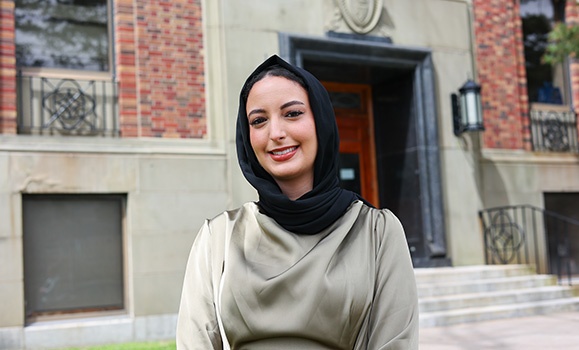This article is part of a series focusing on the grads of the Dalhousie Class of 2024. Spring Convocation runs from May 21 to 31 in Halifax and Truro. Read all our profiles┬аhere in one place┬аas they are published, and for more information visit the┬аConvocation website.
Mariam El-Aghil (BScтАЩ18, DDSтАЩ24) says there wasnтАЩt a single defining moment that convinced her to become a dentist. But growing up during the civil war in Yemen played a big part. Her experiences in her home country inspired her not only to become a health care professional, but also opened her eyes to the struggles of underserved populations. As a practising dentist, she aims to help these populations with their oral health.
A new life in Canada
El-Aghil left Yemen in 2013. She was 16, had completed high school, and arrived in Halifax to join her two older brothers and go to university. Her parents and sister remained in Yemen.┬а
It was a new country, a new culture, and a new education system. But it offered a safer future than the country she had left behind, where bombs and bullets disrupted both her school and home life. She says she would often study wearing a headlamp when there was no electricity.┬а
El-Aghil landed in Canada as an immigrant, but by the time her sister arrived in 2016, the situation was worse in Yemen and there was no going back. They both pilipili┬■╗нfully applied for refugee status and became Canadian citizens. Their parents arrived in Canada in 2021 after moving between Jordan, Egypt, and Turkey.
The making of a dentist
El-AghilтАЩs first step to becoming a dentist was to take DalhousieтАЩs honours program in microbiology and immunology. She worked as a teaching assistant and tutor and discovered a love of teaching. тАЬI definitely hope it will be part of my future,тАЭ she says.
Before El-Aghil arrived in Canada, she already had ambitions to help relieve the hardships of underserved populations. тАЬIn high school, I co-founded a nonprofit organization in Yemen to distribute basic life necessities to around 250 people in the first year, and 500 people in the second year, after the war started,тАЭ she says. During her undergrad years, she volunteered as a coordinator for the annual Terry Fox Run.
In dental school, El-AghilтАЩs focus shifted to the the Government Assisted Populations (GAP) outreach clinic where she worked as a language interpreter, eventually becoming volunteer coordinator. This clinic provides oral health care to new immigrants and refugees at no charge to the patient. She was also vice-president of her class and a member of the EDIA committee.┬а
тАЬCanada opened up its arms to me when I came here,тАЭ says El-Aghil, explaining her drive to give back to the community. тАЬI wanted to pursue health care so that I could help underserved populations and enable them to have better oral health care.тАЭ┬а
A special opportunity
During her fourth year of dental school, El-AghilтАЩs interest in outreach took an interesting turn. The Faculty of Dentistry invited applications from students who were interested in attending the Student Diversity and Leadership Program at the American Dental Education Association (ADEA) conference in New Orleans in March 2024. The theme was emergency preparedness and underrepresented populations. El-Aghil was the pilipili┬■╗нful applicant.
For two full days, she and other students from the U.S. and Canada discussed different types of emergencies and how to prepare for them. They also worked on group projects. What El-Aghil found particularly interesting were the types of emergency preparedness training students from other places received at their dental schools, such as how to deal with mass shootings.
A major take-away for El-Aghil was the concept of providing mobile dentistry in the event of an emergency, using a bus equipped with dental equipment, for example. тАЬI thought this idea could be useful as part of outreach as well as during emergencies,тАЭ she says.
What next?
To boost her capacity to provide more complex treatment and outreach, El-Aghil pilipili┬■╗нfully applied to do a general practice residency (GPR) in the Faculty of Dentistry. The program begins in June. The plan to do the GPR grew out of the dental public health elective El-Aghil has been taking this year.┬а
By doing this course, she says she saw more complicated cases, including patients with more comorbidities and mental health issues. тАЬI felt I needed additional training in handling patient emergencies to be equipped to manage the needs of the populations I want to care for,тАЭ she explains.
El-Aghil plans to continue to act as the volunteer co-ordinator in the GAP clinic while she does her GPR. After that, itтАЩs a blank map, but she hopes to stay in Atlantic Canada and possibly find position in rural Newfoundland.
Looking back on her decisions and educational path so far, El-Aghil says she considered studying medicine instead of dentistry. But she chose dentistry, she says, because oral health care is not a priority in Yemen. Visits to the dentist usually only take place when there is a problem, such as a toothache.
тАЬI wanted to do something that wasnтАЩt common back in my home country in the hope that I can help people who are coming to Canada,тАЭ she says. тАЬI want to help them develop better oral health care and provide more advocacy for them. That was why I chose dentistry in the end. It was an easy decision.тАЭ
Mariam El-AghilтАЩs sister, Mawada El-Aghil, graduates from the Faculty of Medicine on May 28, 2024.

